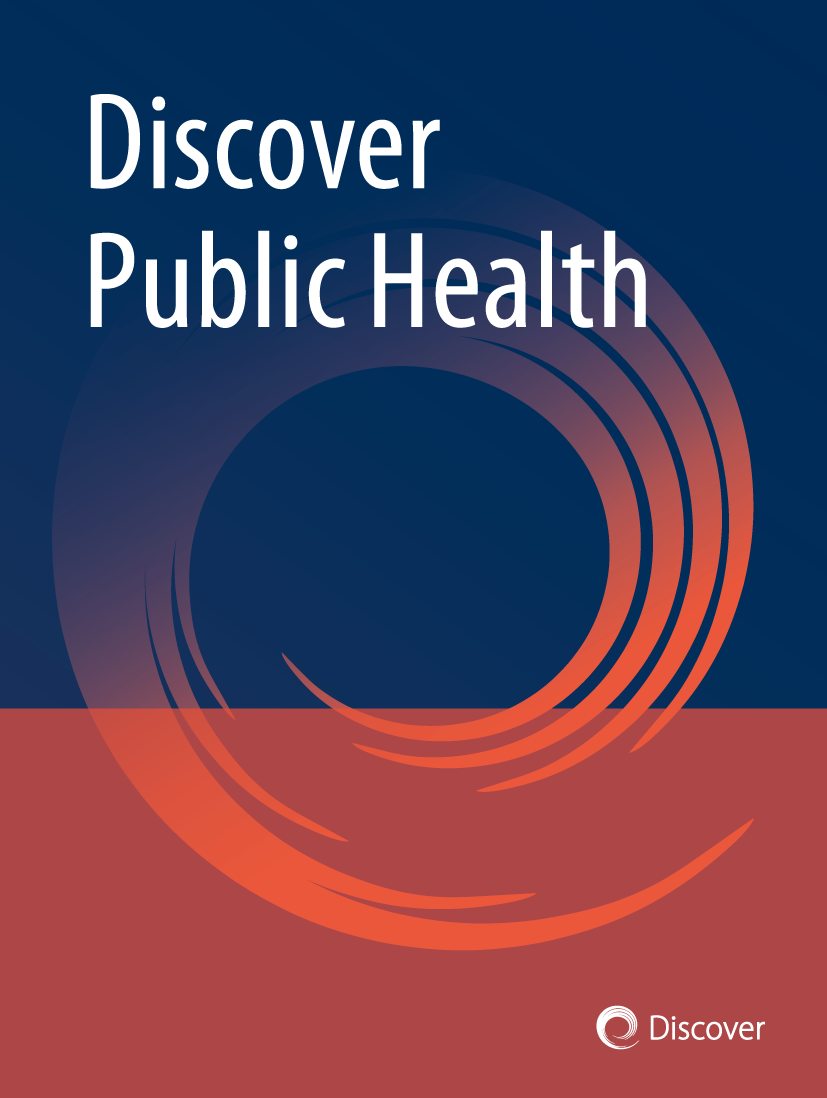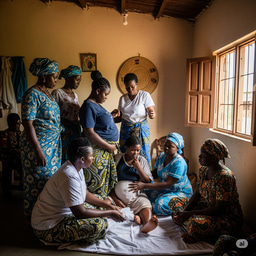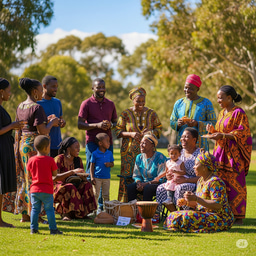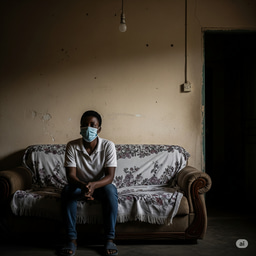Navigating the Pandemic: Unpacking African Migrants' Experiences with COVID-19 in Australia
Published in Social Sciences, Public Health, and Behavioural Sciences & Psychology

The COVID-19 pandemic tested global public health systems, revealing profound disparities and the critical importance of public perception and trust in a successful response. Our recent qualitative study, "African migrants' perception and attitude towards COVID-19 pandemic and its public health response in New South Wales, Australia," delved into the nuanced experiences of African migrants during this unprecedented time. What we uncovered goes beyond simple vaccine hesitancy, revealing deeply rooted skepticism, the powerful influence of misinformation, and the enduring impact of historical contexts on health behaviors.
Challenges: A Labyrinth of Distrust and Misinformation
The most striking challenge we identified was a pervasive skepticism among African migrants regarding the severity of COVID-19 and Australia's public health response. This skepticism was not born in a vacuum; it was amplified by a potent mix of conspiracy theories, inconsistent messaging from authorities, and a perceived racial and cultural "hyper-policing" directed at African migrants during the pandemic.
Many participants expressed beliefs that COVID-19 was a "man-made disease," an "evil scheme" designed to control populations. One participant voiced a strong conviction: "I was not really like sceptical about the disease. But I was quite sure that, uh, you know, it is fabricated. Maybe it is just, you know, another form of war. Uh, you know, some of these viruses can be fabricated in a laboratory and then sent to another country to kill people. Even now, I still believe COVID-19 might have been a biological weapon". Such views were often informed by past negative experiences with governments in their countries of origin and a distrust of Western predictions that Africa would be disproportionately affected.
Vaccine hesitancy was a significant hurdle, underpinned by deep apprehensions about efficacy, safety, and the need for boosters. These concerns were profoundly exacerbated by a fundamental mistrust of government authorities and initiatives. Participants worried about potential long-term side effects, with some even believing the vaccine was a "tester" and they were being used as "guinea pigs" for an underdeveloped solution. One participant poignantly asked, "Is the vaccine really working?.... If it's working, that is well and good... How about the side effects? Are they well-researched? Maybe no". Another shared, "You know, when you take this vaccine, you just never know what the reaction side effects could be. So it's it's not just something, that is a walk in the park. Well, it's your health and the long-term impact of that. So, I think there's a lot of resistance towards it [because of that]".
Beyond health concerns, conspiracy theories took root, with some fearing the vaccine was a ploy to insert microchips for monitoring. Critically, some women reported fears that the vaccine would affect their fertility or pregnancy, leading to profound personal distress. One participant recounted a terrifying experience after vaccination: "I was not scared, but one-when I finished taking [the vaccine], I started, uh, feeling sick. And then, um, one of my friends asked me and said, 'Oh, the vaccine that you take, you can die slowly because now you are sick. You would die. You'll be sick and sick[er] and maybe after three days you would die or after two weeks.... Some of them said, 'uh, you cannot have kids because [you are] vaccinated, they're giving to people to stop them get pregnant.' [others] said, 'you'll start bleeding and when you finish bleeding that's when you die.' So that's when I started feeling scared because I was just feeling maybe [I'll die] I- actually put my finger on my nose and I saw some little bit of blood. I said, 'Oh my God. I think it's my time- it's time to die now'".
The government's vaccine rollout was also heavily criticized for its "top-down" approach and lack of culturally appropriate engagement. Participants felt that mainstream media campaigns, using "Western terminologies," failed to resonate with their communities. Conflicting information from health authorities further eroded trust, leading to widespread confusion about vaccine eligibility and safety. The "militarized" mandating of vaccines, where adherence was tied to employment or travel, was deeply resented, as it stripped individuals of autonomy and choice. As one participant stated, "Look, um, the vaccine, my personal thoughts, I don't trust it. That's the truth. I don't trust it. When-when it first came out, I told myself I'm not going to take it. But finally, I took it to keep my job, I have to take it. But then another thing is the way it was pushed to people. Like, if you don't take the vaccine, you can't do this. They're literally telling you your life is going to be stagnant if you don't take vaccines".
Successes: A Glimmer of Adaptation and Resilience
Despite the formidable challenges, there were subtle successes. For some, the reality of COVID-19 became undeniable when friends and family within the African community fell ill and died. "Um, uh, first, uh, first and foremost, at first, we-even me, I didn't believe there was COVID. I used to think it was a myth, but, um, reality checked in the second I saw most of the people in the [African] community falling sick to-to the coronavirus. That is, when I realised that, yeah, this stuff is really true". This direct experience often superseded previous skepticism, leading to a grudging acceptance of the virus's existence, even if its origin remained suspect.
Furthermore, while vaccine hesitancy was prevalent, some participants ultimately chose to get vaccinated, often driven by pragmatic reasons like job security or access to services. One participant, despite harboring conspiracy concerns, chose vaccination: "To be honest, I did not hesitate to take the vaccine. Uh, even though, like I said, I could say this is a conspiracy and what not, I convinced myself that the disease is there, whether it's natural or it's man-made, the disease is there and it's killing. So, if the disease is there, then there's a need to take a vaccine. Whether it's man-made or natural, you still have to protect yourself. So for me, I wasn't vaccine-hesitant at all... I went for it, even though, you know, you hear a lot of things people saying, everybody has explanations for the vaccine". A small number of participants also expressed a firm belief in science, readily accepting vaccination based on scientific recommendations. These instances, while perhaps not widespread, indicate a capacity for adaptation and a pragmatic approach to health within the community when faced with undeniable realities or compelling external factors.
Implications for Future Research and Public Health
Our findings carry significant implications for future public health responses, especially concerning migrant and racialized communities. The study unequivocally highlights that effective public health initiatives must move beyond a "deficit of information" model. Instead, they must prioritize genuine community engagement, culturally sensitive communication, and a deep understanding of how historical and socio-cultural contexts shape health perceptions and behaviors.
Future research should explore meaning-making processes within diverse communities, recognizing that responses to crises are often shaped by deeply held beliefs, values, and past experiences. Strategies for countering misinformation need to be community-led and built on trust, rather than top-down directives. It is crucial to acknowledge and address the historical mistrust of Western biomedical interventions among African communities, which stems from colonial legacies and unethical practices that exploited power imbalances. Research should also focus on how public health policies can be implemented in a way that respects bodily autonomy and avoids the perception of "hyper-policing" or discrimination, which can further marginalize vulnerable populations.
Untold Stories: History's Shadow on Health
The most poignant and often "untold stories" from our research lie in the historical context that underpins the skepticism and mistrust. For many African migrants, the COVID-19 pandemic was not just a novel virus; it was interpreted through an "Afrocentric lens" shaped by centuries of colonialism, unethical medical practices, and systemic racism.
Participants' fears of being "guinea pigs" or that public health interventions were a "cover" for biomedical experimentation are not irrational but are echoes of a painful history where Black bodies were exploited for medical research. The idea that vaccines might cause sterility or harm, while a conspiracy theory in the immediate context, draws power from a long history of suspicion regarding Western medicine's intentions in African communities.
The feeling of being "targeted" and "blamed" by media and state responses was acutely felt. The example of two African girls from Queensland being "doxed" and plastered across headlines as "enemies of the state" starkly contrasts with the privacy afforded to European Australians who breached the same rules. This hyper-scrutiny during lockdowns reinforced existing feelings of marginalization and racialization, leading to greater suspicion and hesitancy towards public health interventions.
Furthermore, the influence of religious beliefs, viewing COVID-19 as a "bad omen sent by the gods" or a "demon" that cannot be treated by vaccines, speaks to a cultural and spiritual framework often overlooked by mainstream public health campaigns. This clash between scientific discourse and spiritual interpretations disoriented many, disrupting their sense of identity and faith.
In conclusion, our research reveals that understanding the perception and attitude of African migrants towards public health crises requires acknowledging their unique historical, cultural, and social contexts. The challenges faced during COVID-19 were not simply about a lack of information but were deeply intertwined with issues of trust, systemic inequalities, and the enduring legacies of racialized experiences. For future public health endeavors to truly succeed, they must embrace a more inclusive, empathetic, and historically informed approach, building genuine partnerships with communities rather than imposing solutions from above.
The full-text article can be accessed here
Follow the Topic
-
Discover Public Health

This is an open access journal publishing research from all fields relevant to public health.
Related Collections
With Collections, you can get published faster and increase your visibility.
Public Health Strategies for the Management and Prevention of Tobacco Use and Emerging Tobacco Products
Tobacco use is considered as one of the hidden epidemics of the 21st century. Despite many efforts at policy level, tobacco use still remain one of the key factors for high morbidity and mortality worldwide. Globally around eight million people die due to tobacco consumption while daily people are diagnosed with lung cancer, COPD, cardiovascular diseases etc., with main factor being the tobacco consumption. Tobacco prevalence range between and within regions and countries as well as between male and female gender. Tobacco uses usually starts at adolescent and continue in the later life. At global level several initiatives have been undertaken with the WHO-FCTC being one of the most important. Additionally, at national levels countries have undertaken several initiatives but with not very successful results. On the other hand, tobacco industry is putting priority in the new products such as electronic cigarettes, heated tobacco etc. These products are not considered in many regions and countries as the normal tobacco products with their taxation, availability and use being different. To some extent, healthcare systems are not performing well in the management of the tobacco use which is considered a chronic condition. Availability of new medicaments and approaches and techniques is still a problem in many settings worldwide. Combination of tobacco use and other substances is also a critical issue.
This Collection aims to discuss key strategies for management of tobacco use and the new products at local, national, regional and global level as well as to propose key measures for healthcare personnel and policymakers in order to manage key challenges. Authors from different settings and different backgrounds are invited to submit their works to this Collection. Reviews and systematic analyses and meta- analyses, original articles, policy papers and case-studies are more than welcome to be submitted.
Research areas may include but are not limited to the following:
- Tobacco consumptions
- New tobacco products
- Prevention and management of tobacco use
- Substance use
- Technology and public health
- Prevention and health promotion
Keywords: tobacco, heated tobacco, public health, health policy, prevention and health promotion
This Collection supports and amplifies research related to SDG 3.
Publishing Model: Open Access
Deadline: Apr 30, 2026
Antimicrobial Resistance: The New Challenge to Global Health in a Post-Pandemic World
Antimicrobial resistance (AMR) is a seriously ongoing threat to global health, occurring when bacteria, fungi, viruses, and parasites evolve to resist the drugs designed to kill or block them. The COVID-19 pandemic has both directly and indirectly exacerbated the problem of AMR, as the overuse of antibiotics has accelerated the development of resistance in many pathogens. COVID-19 may have subsided, but AMR continues to pose a significant risk to the effectiveness of global healthcare systems, threatening to reverse decades of progress in combating infectious diseases. The interplay between population health and AMR has become increasingly critical as healthcare practices have shifted in response to the pandemic. Understanding this relationship is essential for developing effective strategies to mitigate the impact of AMR on population health in a post-COVID context.
The motivation for launching this Collection arises from the urgent need to address the rising tide of AMR as healthcare systems grapple with the long-term effects of the pandemic. Increased antibiotic use during COVID-19 treatment, changes in healthcare access, and disruptions in public health interventions have all contributed to an environment where AMR can thrive. Moreover, the pandemic has highlighted the importance of a multidisciplinary approach to tackling AMR, involving epidemiology, policymaking, and community health initiatives. This Collection aims to provide a platform for researchers and practitioners to share insights and findings that can inform future strategies to combat AMR while considering the broader implications for population health.
This Collection aims to highlight the multifaceted nature of AMR in a post-pandemic environment. We solicit articles that investigate the particular issues provided by the pandemic in terms of AMR development and containment, examine the impact of AMR on many sectors of healthcare, and propose novel strategies to minimize resistance propagation. Submissions may include original research, policy assessments, program evaluations, and comments on the following major areas:
• Epidemiology and trends of AMR post-pandemic
• Impact of COVID-19 on antibiotic usage
• Surveillance strategies for AMR
• AMR and stewardship
• Prevention and control measures to limit AMR spread
• Policies and programs to promote antibiotic stewardship
• Economic and social implications of AMR
• Global collaboration and initiatives to tackle AMR
By addressing these critical issues, this Collection aims to provide a comprehensive understanding of the emerging challenges in antimicrobial resistance in a post-pandemic world and to promote effective strategies to preserve the power of our current antimicrobials.
Keywords: antimicrobial resistance; COVID-19; antibiotics; global health; infectious diseases; public health; policy; prevention
This Collection supports and amplifies research related to SDG 3.
Publishing Model: Open Access
Deadline: Jun 30, 2026





Please sign in or register for FREE
If you are a registered user on Research Communities by Springer Nature, please sign in